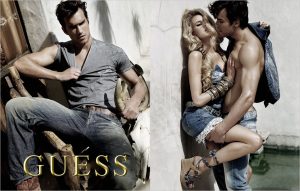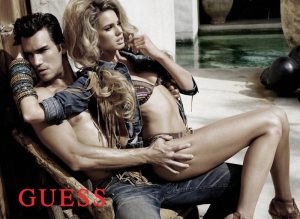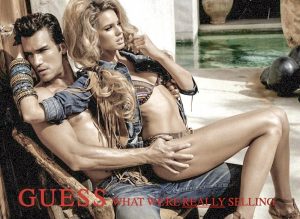Original Advertisements:


The ads used for my culture jam assignment are from a 2014 collection by Guess, an American clothing brand. From an aesthetic viewpoint, the ads are edited by desaturating the natural colours while increasing the contrast to accentuate the contours of the subjects. As for the actual purpose of the ads, which is to sell the brand’s products, the models are positioned to bear sexual overtones. While these are common strategies used by marketers to appeal to consumers, it is important to consider the implications of these ads.
For the purpose of my culture jam assignment, I explore how connotations of sexuality, heteronormativity and Western beauty standards are employed to transcend the value of the products beyond their use value. Foremost to this analysis is the irony of the ads themselves. Despite Guess being a clothing brand, the models are either dressed seminude or prepared to strip. Seemingly, the focus of the ads is redirected from the clothing being sold to the social values and ideas surrounding the brand image. As an American brand, Guess ads are typified by white models that act as the premise of desirable attributes. The imposition of such norms are also accompanied by the sexualization of gender roles. In both ads, the presumably female models serves as a subsidiary subject through the objectification of her body. She is held as a possession of the presumably male model in a way that would otherwise be inappropriate for an everyday public context. If these are the ads that Guess is willing to publish, then they are a reflection of what the brand endorses. By being a consumer of their products, Guess is suggesting that you can resemble the Western ideals of beauty and that you can acquire a certain level of sexuality. This is further problematic as these messages are gendered. Whether it is a subconscious or conscious decision on behalf of the consumer, purchasing and wearing Guess becomes a symbolic gesture of reaffirming marginalizing ideologies. It is from this point that we should question what is really being sold.
Jammed Advertisements:


To highlight the implications of these ads, I first re-edited the images by lowering the contrast and returning the more natural colours to the subjects. My intentions of doing this was to reduce the dramatic effect of the ads to reveal the contrived positioning of the models in a more mundane setting. I then added text to create a rhetoric out of the brand’s logo. By posing the text as a statement rather than a question, I wanted the ads to seem patronizing to its consumers. Together, my alterations were meant to invoke the disillusionment of the consumer to the social value of the products and to see these products for their true purpose. If these ads were to appear in public without the brand’s logo, it is hard to imagine what these images were for. Companies have constructed and attached social values to their products which have condemned their consumers to a fetish of commodities. For this reason, I believe that consumers must be reminded of the actual product that they are purchasing and not the ideas surrounding it. There is no intrinsic property specific of Guess clothing that will provide fulfillment to the ideas conceived by the consumer. For instance, purchasing a pair of jeans or a t-shirt from Guess will serve the same function as purchasing clothing from any other brand. However, given the context of these ads, ads that glorify the sexualization of gender roles and the hegemony of Western beauty standards, purchasing clothing from Guess means much more than just buying a product. Instead, it has deeper insinuations as the act of purchasing is inadvertently transmuted into the support of an ideology that underlies many of the plights feminists must oppose. Although my culture jam assignment is directed towards Guess, its purpose is equally applicable to all our decisions as consumers. As conscious consumers, we must be wary of the brands we buy into and what they represent, otherwise, we may perpetuate the ideology and social climate that facilitates regressive acts and discrimination.